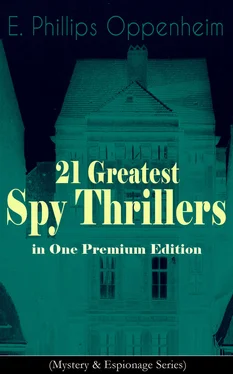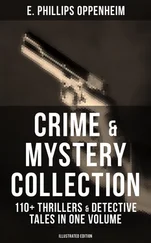“Is there any news to-night,” the Archduke enquired.
“Nothing special,” Mildenhall replied. “I am not formally attached to the Embassy now so I have not seen any of the code messages, but I believe most of the telegraph wires are cut between here and the northern frontier and there are rumours that the internal railways have been commandeered.”
“Any news of my friend Benjamin? That is a person for whom I am most anxious.”
Charles looked around cautiously. Notwithstanding the great crowd, their corner was almost empty.
“I dined with him at his wonderful house tonight,” he confided. “It was not a party. I met him in his bank and he asked me to come several days ago. He looked well but I fancy he was continually receiving disturbing messages.”
“The times have changed,” the Archduke murmured. “In the old days, when there was an uprising like this amongst the nations, it was the aristocrats who went shivering for their lives. Now it is the Jews. A senseless, ignorant, cruel persecution, it seems to me. Leopold Benjamin is a great man and a great gentleman. He has done more for Vienna than any-other citizen, yet they tell me if the Nazis get hold of him it will probably mean assassination and the confiscation of all his treasures. My heart has been in my own country home, in my own mountains and forests since 1918, but Vienna still means much to me. I know that Benjamin has parted with more than a million pounds to charities during the last twenty years. I would sit at his table with pleasure if he invited me.”
“I am afraid it will be a long time before he entertains again in Vienna,” Charles sighed. “It was almost a home party to-night and there wasn’t anyone there who wasn’t anxious to have him cross the frontier. Mr. Benjamin was called away towards the end of the meal. He did not reappear.”
The Archduke nodded understandingly.
“My wife and I are leaving in a few days,” he said. “We have relatives in Italy, but I ask myself how we should be received in France.”
“France is always a gracious country,” Charles reflected. “There is Egypt, too…Here is my friend Lascelles. He looks as though he might have news.”
“A message from His Excellency,” the latter announced as he joined them. “You excuse me, sir?” he added, turning to the Archduke.
“Certainly.”
“It is no longer a secret,” Lascelles continued. “The Germans have crossed the frontier and are marching upon Vienna. There is no resistance, but in face of the disturbed condition everywhere we are ordered to quit. We have a special train at eight o’clock this morning, Charles. His Excellency wants to know if you will join us. He thinks that there may be considerable delay if you stay on here.”
“Join you? Why, rather!” Mildenhall agreed. “I’ll get round to the hotel and pack.”
“Eight o’clock at the Western Station.”
For the first half hour after his arrival at the hotel Mildenhall set the valet to work packing and occupied himself in sorting and destroying the few papers he possessed of any importance. As soon as he had finished his task he rose and went to the safe which was set into the wall by the side of his bed. He unlocked it and swung back the door. For a moment or two he stood motionless. Then he called the valet.
“Fritz,” he said, “there was a parcel in this safe when I left for the ball this evening.”
“A parcel, sir?”
“A leather case. Inside there was a book.”
The man shook his head.
“I’ve never seen such a thing, sir,” he replied. “You probably remember, sir, that you gave me the evening off.”
“Quite right. When you came back were there any signs of anyone having been here?”
“None, sir.”
Charles made no further remark. Fie took the packets of money which were the sole contents of the safe and relocked it.
“I’m going out for an hour, Fritz,” he said. “Get on with the packing. Leave me out a lounge suit and an overcoat. You can send my uniform round to the Embassy later on. I shall be back in plenty of time to change.”
“Very good, sir. I’m sorry about the parcel.”
“My mistake, perhaps, Fritz. I’m not blaming you in any way.”
On his way out he stopped at the bureau. The reception clerk hurried up to him.
“Tell me,” Charles asked, “has anyone called to see me to-night whilst I was out?”
The man smiled. He leaned a little farther across the counter.
“Only the lady who was with you when you went upstairs this evening, sir,” he confided. “She came back about an hour after you had left for the Embassy.”
“She came back?” Charles repeated thoughtfully.
“She asked for the keys of your room, sir. I hope I was right in giving them to her?”
“Of course. Did she return them to you?”
“Yes, sir. She was only upstairs for about a quarter of an hour. She said she hoped to see you later.”
Mildenhall nodded and turned away. He spent a few minutes in the telephone box, stepped outside, ordered a taxi and drove to a small block of apartment flats on the other side of the Ringstrasse. He leaned across the counter to the sleepy concierge .
“The Baroness von Ballinstrode,” he whispered confidentially. “She is expecting me.”
The man rubbed his eyes, gazed in awe at Mildenhall’s uniform and handed him the keys. The yawning lift boy took him up to the third floor. He opened the door of the number on the keys softly and found himself in a small hall. He passed through another door and entered a delightful little sitting-room half filled with roses. The door of the bedroom leading from it was wide open. Before an elegantly shaped oval mirror the Baroness was seated in the most negligible of negliges. Her golden hair in a long stream hung over the back of her chair. A dark complexioned Viennese maid was brushing it with intense care. It was not until Mildenhall had advanced half-a-dozen paces that they were aware of his presence. The maid screamed and dropped the brush. The Baroness sat for a moment as though turned to stone. Then she sprang to her feet, wrapped her diaphanous dressing-gown a little more closely around her and came forward with outstretched hands.
“But, my friend!” she cried. “This is marvellous!”
He stood motionless. She came fearlessly up to him. Her expression was a curious mixture of fear and joy. Her eyes questioned him feverishly.
“Where have you come from?” she demanded.
“From the ball.”
She suddenly realized that he was unresponsive. The eyes that met hers were hard.
“You have come direct here?” she asked.
“No,” he answered. “I called at the hotel.”
She turned round and closed the door behind her.
Then she flung herself on to a small divan and lay back amongst the cushions, her fingers clasped behind her head.
“You are angry with me, Charles,” she said.
“Yes,” he replied. “I am angry with you. There is little time to spare. Give me that book.”
“Why do you say there is little time to spare?” she demanded. “The morning is young. We have many hours. There is wine on the sideboard there. Give me some and serve yourself. We must not quarrel, Charles.”
Her voice was a caress but its sweetness was wasted upon him.
“Baroness—” he began.
“Beatrice,” she interrupted.
“Beatrice, then,” he continued. “I want my book.”
“Why do you think that I have your book?” she asked.
“Because they told me at the hotel that you had been there and asked for my keys, which they were foolish enough to give you. Afterwards you apparently helped yourself to the book which was in my safe and returned with it here. You have exactly five minutes to hand it over.”
Читать дальше












